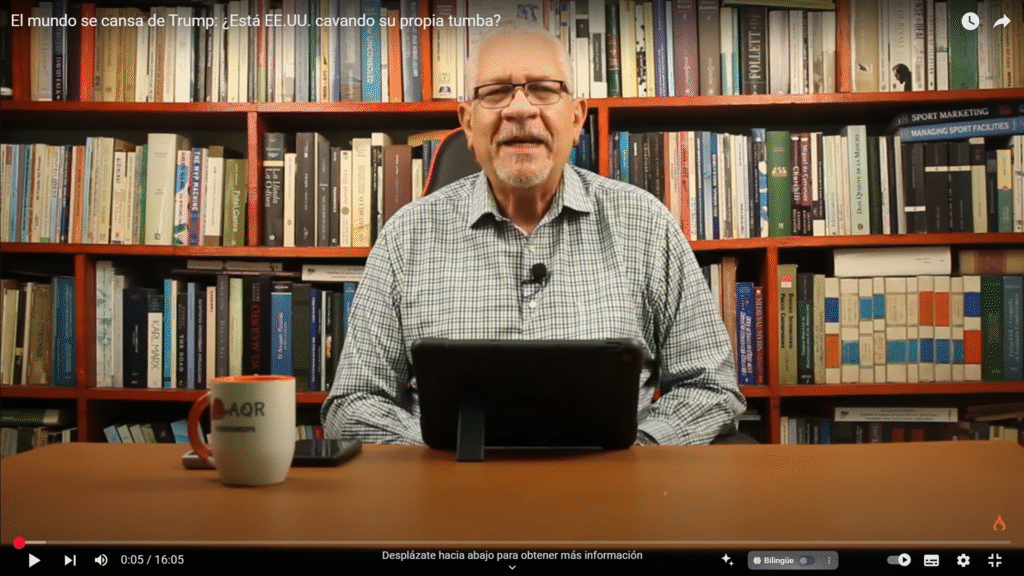Is it possible that the United States is accelerating its isolation in an increasingly interdependent world? As former President Donald Trump insists on imposing a new global order centered on American interests, the consequences of his decisions could be weakening the very thing he seeks to strengthen: his nation’s power and leadership. From the imposition of extreme tariffs to his rejection of key international institutions, his policies have generated a global backlash that goes beyond trade.
Today, more than ever, multipolarity is a reality: multiple power centers such as China, Russia, India, the European Union, the BRICS, and ASEAN are building a new global architecture. In this scenario, Trump’s unilateralist approach is not only ineffective, but could be digging the grave of US hegemony.
What’s happening to US leadership in the world?
Donald Trump has pursued a foreign policy based on the imposition of punitive tariffs, the withdrawal from multilateral agreements, and the isolation of international institutions such as UNESCO, the Human Rights Council, and the WTO. These decisions reflect a desire to restore the United States to a dominant position, but they ignore a key truth: the world is no longer unipolar .
Instead of a single superpower dictating the rules, today we have a multipolar order , characterized by economic, technological, energy, and diplomatic interdependence. Trump, refusing to accept this reality, has opted for coercive tactics that affect not only his adversaries but also his traditional allies.
5 key impacts of Trump’s strategy on the global stage
- Strategic isolation of the United States
- By withdrawing the US from global agreements and institutions, Trump is reducing its capacity for multilateral influence and leaving room for other actors to take its place.
- Chain reaction of alternative alliances
- Blocs like BRICS and ASEAN are growing precisely in response to U.S. policies. They are seeking alternatives to the dollar and new trade agreements outside the U.S. sphere.
- Weakening of the dollar as the dominant currency
- Financial restrictions and sanctions have led other countries to develop mechanisms parallel to the Western financial system, affecting the historical role of the dollar.
- Fall in international credibility
- Abandoning moral and diplomatic leadership has damaged the global image of the United States, which has historically been seen as a defender of democracy and human rights.
- Internal repercussions: inflation, unemployment and discontent
- Tariff policies have made products more expensive, reduced exports, and affected job creation. Even the manipulation of labor statistics has drawn strong criticism.
How the new world order is taking shape
To understand the consequences of this shift, it’s important to recognize that a multipolar world means not only more centers of power, but also complex networks of cooperation . Trade, technology, energy, and security can no longer be centralized in a single nation.
Countries such as China, Russia, and India have begun establishing alternative trade routes, investing in their own digital currencies, and forming institutions such as the New Development Bank (NDB) and the China Interbank Payment System (CIPS), which compete with the Western-dominated SWIFT.
In this context, the unilateral imposition of rules and tariffs by the US becomes unsustainable . What Trump calls “making America great again” could, in practice, be a strategic mistake that weakens the very structures that gave his country its power.
What can a country do in the face of US protectionism?
While the effects of this policy are already being felt, there are some strategic responses that countries can implement to resist and adapt:
- Diversify your business relationships
- Expanding markets and partners beyond the United States helps reduce economic dependence and confront sanctions with greater resilience.
- Strengthen multilateral and regional agreements
- Cooperation between neighboring countries or regional blocs can compensate for the loss of access to traditional markets.
- Promote alternative currencies
- Promoting local currencies or alternatives to the dollar as a means of international exchange is a key tool for economic sovereignty.
- Investing in technological autonomy
- Developing our own capabilities in strategic sectors such as telecommunications, artificial intelligence, and energy is essential to resisting blockades and sanctions.
- Strengthen independent multilateral institutions
- Supporting organizations that are not exclusively dependent on the U.S. helps ensure a more level playing field for all international actors.
Key recommendations for understanding and adapting to this global transformation
- It studies the behavior of emerging alliances such as BRICS+, which include countries like Brazil, China, India, Russia, South Africa, and even Saudi Arabia and Argentina.
- He closely follows changes in the international financial system , such as the evolution of central bank-backed digital currencies.
- Observe the role of middle powers (Turkey, Iran, Indonesia, Mexico), which are gaining prominence in key regions.
- Evaluate how all this impacts your country , especially in terms of foreign trade, fiscal policies, and diplomatic relations.
In times of accelerated geopolitical change, understanding global power dynamics is not just an academic matter: it is essential to anticipating risks and opportunities . Trump’s strategy, focused on strengthening the United States through confrontation and protectionism, may bear fruit in the short term, but its medium- and long-term consequences could be counterproductive.
The signs are already there: loss of legitimacy, isolation, inflation, falling exports, and a world reorganizing itself without Washington as its axis. Start informing yourself today and actively participating in global debates. Understanding multipolarity is the first step to staying ahead of the transformation of the world order.



